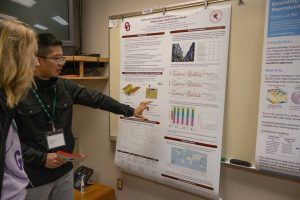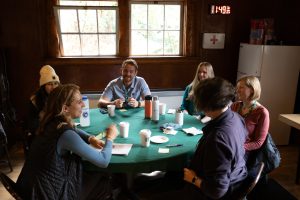Graduate Climate Conference 2024: A step towards interdisciplinary collaboration and dialogue in addressing the climate crisis
The Graduate Climate Conference (GCC) provides a unique forum where emerging scientists can exchange ideas, share research and build interdisciplinary collaborations to address the climate crisis. Now in its 18th year, the conference was held on November 1-3, 2024, at the Pack Forest Conference Center, hosting nearly 120 graduate students from institutions in the U.S. and internationally. Organized by graduate students for graduate students, the GCC’s mission is to strengthen student connections and advance climate research in a supportive, inclusive environment.
Since its first gathering in 2006 at Pack Forest near Mount Rainier, the GCC has grown into a key student-led event, hosted alternately by the University of Washington (UW) and the Massachusetts Institute of Technology (MIT). Each year, the conference provides a unique setting for students to present research spanning diverse areas – atmospheric science, policy, oceans, cryosphere, ecosystems, and human impacts. The program features keynote speakers, presentations, poster sessions, and workshops, with a strong emphasis on science communication. The conference’s unified session format gives participants the chance to explore a wide range of interdisciplinary work, encouraging them to engage with climate science beyond their own fields and fostering cross-disciplinary exchange while strengthening their outreach and communication skills.

The 2024 GCC, supported by the National Science Foundation, UW’s Program on Climate Change, and other sponsors, introduced new workshops from community partners that emphasized practical applications of climate science. The Ai2 Workshop, led by Andre Perkins and Elynn Wu from the Allen Institute for AI’s “AI for the Environment” initiative, offered participants hands-on experience with the Ai2 Climate Emulator (ACE). Attendees gained insight into ACE’s capabilities and limitations, ran an AI-powered climate model, and explored potential future scientific use cases for AI in climate studies. In the “How to Get Your Science into Action” workshop, led by Tyler Kukla of CarbonPlan, participants learned strategies for translating research into real-world impact. The session focused on building actionable frameworks, mapping pathways from research findings to climate solutions, and identifying successful examples.
The conference also featured two student-led workshops. In “Climate Justice through Community Action“, Frank Alamoh of Georgia State University guided participants in strategies for engaging diverse communities, particularly vulnerable populations, in climate advocacy. The session focused on turning scientific data into actionable initiatives and fostering inclusive dialogue. The workshop “Scientist as Peacemaker: Building Bridges Between Researchers and the Public” by Jonathan Anderegg of Ohio State University addressed public skepticism towards science. Participants learned how to build trust with local communities, bridge divides, and create shared solutions, which focus on collaboration and understanding rather than just repeating scientific facts. The session emphasized reframing conflict and finding common ground to develop lasting solutions to the climate crisis.
A highlight of the conference was the two keynote speeches. Early career scientist keynote speaker Dr. Marysa Lague, an atmospheric scientist at the University of British Columbia, shared her interdisciplinary research on how land changes drive shifts in both local and global climates. Beyond her scientific findings, Dr. Lague provided a personal view of her career path and shared valuable insights and practical advice for early-career scientists interested in exploring academic pathways. Dr. Hannah Zanowski, Diversity, Equity, Inclusion, & Justice keynote speaker from the University of Wisconsin-Madison, discussed her commitment to increasing diversity in the geosciences through initiatives like the Student Training in Remote Sensing and Meteorology (STORM) Research Experiences for Undergraduates (REU) program. In particular, Dr. Zanowski emphasized that collectively, we have the power to drive the changes we wish to see in academia, towards a more inclusive and equitable academic environment.
highlight of the conference was the two keynote speeches. Early career scientist keynote speaker Dr. Marysa Lague, an atmospheric scientist at the University of British Columbia, shared her interdisciplinary research on how land changes drive shifts in both local and global climates. Beyond her scientific findings, Dr. Lague provided a personal view of her career path and shared valuable insights and practical advice for early-career scientists interested in exploring academic pathways. Dr. Hannah Zanowski, Diversity, Equity, Inclusion, & Justice keynote speaker from the University of Wisconsin-Madison, discussed her commitment to increasing diversity in the geosciences through initiatives like the Student Training in Remote Sensing and Meteorology (STORM) Research Experiences for Undergraduates (REU) program. In particular, Dr. Zanowski emphasized that collectively, we have the power to drive the changes we wish to see in academia, towards a more inclusive and equitable academic environment.

The conference featured a diverse range of topics across several oral and poster sessions. Oral sessions included discussions on extremeevents, hydrological cycles, climate adaptation and resilience in various sectors, ecosystem monitoring, air-sea interactions, atmospheric chemistry, climate and ocean dynamics, as well as glacier research. Poster presentations covered similar themes, such as the drivers of extreme events, hydrometeorology, groundwater and streamflow, and the role of oceans in biogeochemistry and dynamics. Other topics explored included climate adaptation policies, technology, and resilience in ecosystems, built environments, and croplands, as well as the carbon cycle, vegetation, and paleoclimate.
 In addition to the academic sessions, the conference also featured social activities, including a trivia and movie night, as well as the traditional Halloween costume party and contest. Following the event, participants had the opportunity to join a tour of Seattle.
In addition to the academic sessions, the conference also featured social activities, including a trivia and movie night, as well as the traditional Halloween costume party and contest. Following the event, participants had the opportunity to join a tour of Seattle.
Responses to a post-conference survey showed how the conference helped them connect and advance their work on climate change. According to their feedback, students ”really enjoyed it and found it to be one of the most fruitful experiences I have had as a graduate student […]”. They appreciated that it “[…] was super helpful to be able to continue to meet people, get exposed to a lot of the science”.
The GCC is another important step in empowering the next generation of climate scientists to collaborate, expand their knowledge, and take meaningful action in addressing the climate crisis, and we look forward to what future years will bring.
Written by: Christina Draeger (University of British Columbia), Abby Beilman (Michigan State)
Organizers and more information can be found on the Graduate Climate Conference webpage. You can read about past conferences on the PCC page. Read more about the significance GCC has for grad students through the PCC and the decade recap from AGU.